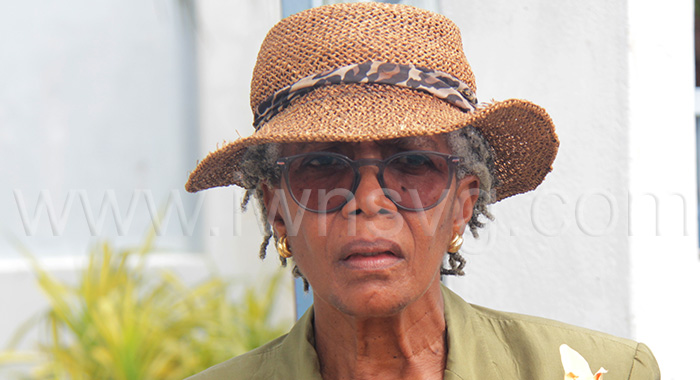The Court of Appeal on Thursday overturned the October 2021 decision of then Chief Magistrate Rechanne Browne to stay permanently proceedings against activist Luzette King in connection with an incident at Argyle International Airport (AIA) on Jan. 30 that year, during the COVID-19 pandemic.
King’s legal team had argued successfully argued that state wanted to punish the activist twice, alleging that she had been deported and then charged when she returned the SVG one week later.
In a Jan. 31, 2021, Facebook live video, King, a retired nurse, had explained what had occurred at AIA, after she arrived on a flight from the United States the previous day, when she “I ran to hell out”.
On Thursday, the Court of Appeal, sitting in St. Lucia, ruled that the then chief magistrate erred in granting a stay of prosecution by abuse of process.
The Appeal Court has sent the matter back for trial before a magistrate.
UK-based Vincentian lawyer Guevara Leacock, holding papers for lead counsel Kay Bacchus-Baptiste, and Ronnia Durham Balcombe appeared for the respondents during a virtual appearance before the court on Thursday, when the ruling was handed down.
Renee Simmons, holding papers for Director of Public Prosecution, Sejilla Mc Dowall, appeared for the applicants in the matter.
The full judgment was not available at the time of publication of this article.
King, a now 73-year-old opposition activist, had been before the court on charges that on Jan. 30, 2021, at AIA, contrary to Section 27 (d) of the Immigration Act, she “did enter the state by air and did not present yourself in person to the nearest immigration officer as required by s. 10 (3)”.
She had been further charged that on the same date and place, she “upon arrival into the State of St. Vincent and the Grenadines, failed to declare anything contained in your baggage, or anything carried on you, or produce your baggage for examination to the nearest customs officer on duty at the said Argyle International Airport”.
A third charge had been that on the same date and place, at AIA, “upon your arrival into the state of St. Vincent and the Grenadines, prevented the carrying out of a search for anything which is liable to be forfeited, detained, seized, or removed, by not presenting yourself to the Customs officer on duty at the said Argyle International Airport”.
After the incident, King, a St. Vincent and the Grenadines (SVG) citizen who was born in Curacao to Vincentian parents, had been immediately deported to the United States, where she also has legal status.
The charges against her had been brought after she returned to SVG from the United States one week later, on Feb. 6, 2021.
In Aug. 10, 2021 written submissions to the court, King’s legal team had pointed out that a state witness had alleged that King had passed the immigration and customs before being brought back into the airport and deported.
The lawyers had said that the immigration and customs officers had King in their ambit then but decided not to charge her. Rather, they concurred and assisted in having her removed from the country “without due process”.
However, Tammika Da Silva-Mc Kenzie, who was then an assistant director of public prosecution, in her response to the defence’s submission, had said that King was “prohibited” from proceeding to clear with Immigration and Customs.
“The delay in bringing the charges is significant, not only because of the length of time, but because of the intervening decision of the state to exact a punishment that could only be sanctioned by the court,” the legal team said.
They said that the “best remedy for the court is to distance the judicial system from the impugned conduct of the state”.
The lawyers said that the court was not being asked to discipline the state “but there cannot be a strong public interest in seeing the defendant prosecuted by the state for alleged offences where she was already punished as stipulated by the prosecutorial code of conduct of SVG”.
They had said that King’s legal team was asking the court to “guard against the state as prosecuting authority, believing that its conduct in relation to the defendant in the circumstances could be acceptable.
“That essentially, they could punish the defendant then expect the court to also punish the defendant for the same incident. To involve the court in facilitating the prosecution of a defendant who has been the victim of misuse of state power would compromise the integrity of the judicial system.”
However, in her submissionon behalf of the Crown, Da Silva-Mc Kenzie had said that King had contravened the regulations enacted to safeguard the populace as a result of the COVID-19 pandemic.
She had said that King’s claim that she was deported was unsupported, adding that the defendant had furnished no proof illustrating her deportation.
The Crown posited that King was not deported.
“… in fact, she never presented herself to the Immigration authorities for such a consideration to arise,” the then assistant DPP had reasoned.
Da Silva-Mc Kenzie had said that inasmuch as ordinarily, in pre-COVID-19 times, the immigration Department would be the first authority to determine whether a person can enter SVG, this did not apply in King’s case.
King “never presented herself to the immigration department for such a determination to be made,” the prosecutor had said.






